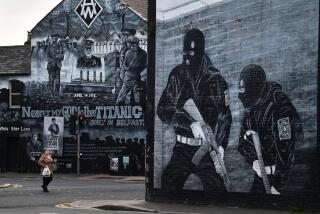J. Chichester-Clark, 79; Led N. Ireland for 2 Years
- Share via
LONDON — James Chichester-Clark, whose 1969-71 tenure as prime minister of Northern Ireland was marked by escalating sectarian violence that brought more British troops, has died. He was 79.
Chichester-Clark, who was given the title Lord Moyola in 1971, died May 17 after a short illness, his family said.
He was prime minister in the British province when rioting in Belfast and Londonderry forced him to ask British Prime Minister Harold Wilson’s government to send in troops. The situation deteriorated, however, and Chichester-Clark faced a Protestant backlash when the British government urged reforms to make public housing allocation fairer for Catholics.
Throughout 1970, the ranks of Protestant paramilitaries grew, and there were increasing gun battles between the British army and the Irish Republican Army.
The killings of three British soldiers in Belfast in March 1971 sparked a new Protestant campaign demanding that Chichester-Clark resign.
He flew to London to ask Prime Minister Edward Heath for a dramatic security response, but was given only 1,300 more soldiers.
Two days later, Chichester-Clark resigned, saying that he saw no other way of “bringing home to all concerned the realities of the present constitutional, political and security situation.”
He became an active member of the House of Lords, speaking regularly on Northern Ireland issues and rural affairs.
Britain now rules Northern Ireland directly.
Chichester-Clark was born Feb. 12, 1923. He joined the army and during World War II was an officer in the Irish Guards. He was wounded during fighting in Italy in 1944 and retired in 1960 as a major.
He was a member of the Northern Ireland Parliament at Stormont from 1960 to 1972. He represented South Derry before becoming leader of the house and minister of agriculture. He was named prime minister in May 1969 after Terence O’Neill stepped down.
One of Chichester-Clark’s first acts was to order an amnesty for those convicted of, or accused of, political offenses in the previous seven months. However, that gesture generated little response, as did his appeal to opposition lawmakers to jointly declare that Northern Ireland was at peace and would remain so.
More to Read
Sign up for Essential California
The most important California stories and recommendations in your inbox every morning.
You may occasionally receive promotional content from the Los Angeles Times.













